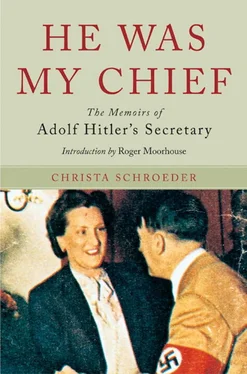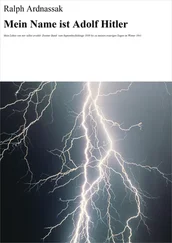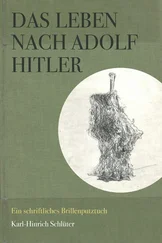Christa Schroeder - He Was My Chief - The Memoirs of Adolf Hitler's Secretary
Здесь есть возможность читать онлайн «Christa Schroeder - He Was My Chief - The Memoirs of Adolf Hitler's Secretary» весь текст электронной книги совершенно бесплатно (целиком полную версию без сокращений). В некоторых случаях можно слушать аудио, скачать через торрент в формате fb2 и присутствует краткое содержание. Город: Barnsley, Год выпуска: 2012, ISBN: 2012, Издательство: Frontline Books, Жанр: История, Биографии и Мемуары, на английском языке. Описание произведения, (предисловие) а так же отзывы посетителей доступны на портале библиотеки ЛибКат.
- Название:He Was My Chief: The Memoirs of Adolf Hitler's Secretary
- Автор:
- Издательство:Frontline Books
- Жанр:
- Год:2012
- Город:Barnsley
- ISBN:978-1-7830-3064-4
- Рейтинг книги:4 / 5. Голосов: 1
-
Избранное:Добавить в избранное
- Отзывы:
-
Ваша оценка:
- 80
- 1
- 2
- 3
- 4
- 5
He Was My Chief: The Memoirs of Adolf Hitler's Secretary: краткое содержание, описание и аннотация
Предлагаем к чтению аннотацию, описание, краткое содержание или предисловие (зависит от того, что написал сам автор книги «He Was My Chief: The Memoirs of Adolf Hitler's Secretary»). Если вы не нашли необходимую информацию о книге — напишите в комментариях, мы постараемся отыскать её.
He Was My Chief: The Memoirs of Adolf Hitler's Secretary — читать онлайн бесплатно полную книгу (весь текст) целиком
Ниже представлен текст книги, разбитый по страницам. Система сохранения места последней прочитанной страницы, позволяет с удобством читать онлайн бесплатно книгу «He Was My Chief: The Memoirs of Adolf Hitler's Secretary», без необходимости каждый раз заново искать на чём Вы остановились. Поставьте закладку, и сможете в любой момент перейти на страницу, на которой закончили чтение.
Интервал:
Закладка:
When the German armies were surprised by the terrible winter of 1941, and stuck fast in the Russian ice, Hitler was frequently depressed, but remained hopeful as before of a quick victory: ‘It is no more than a quite thin veil which we have to penetrate’, he said, ‘we must be patient. The Russian resistance will not endure.’ The veil was not torn asunder and our stay at Wolfsschanze grew ever longer.
Letter, FHQ Wolfsschanze , 6 January 1942:
…your other observations about morale in the Reich, the Church etc. I found very interesting. I believe that the mood will very soon revive once more great successes begin to be announced, e.g. when Leningrad falls. The harvest will ripen in the next ten days anyhow. The boss has a principle of not making Special Announcements until a battle is definitely won because premature claims can alert the enemy to his danger and imperil lives. He often finds himself in a dilemma over this: he would like to calm the country, but on the other hand deny the enemy any details.
I can well imagine that the churches are full, but I share your opinion (which is also that of the boss) that nothing can be undertaken at the moment. That will have to wait for after the war…
Incidentally a gramophone was introduced into the Führerbunker a fortnight ago and now almost every evening we hear the songs of Strauss, Hugo Wolf and primarily Wagner of course. I have a very special liking for the Heimliche Aufforderung by Strauss sung by Schlusnus and on another occasion by a tenor from Graz who tends towards being baritone: Peter Anders (you should remember the name when buying records!), he has a very soft, fawning voice, but very clear diction. These songs are wonderful, one is quite lulled into love and warmth which apparently has an effect on the boss too, for yesterday evening he said to us girls: ‘Children, you must use every hour!’ I should like to have told him: what does he imagine, I should like to know, I can do to enjoy my youth when we crouch down with him day in day out, year in year out and never get away. Yes, yes, theory and practice…
Letter, FHQ Wolfsschanze, 15 January 1942:
Scarcely had I posted my letter of moans and groans than your dear letter arrived, which I read voraciously. I wrote to you in reply at once a long, long letter which I held back a few days because my outpourings would surely have been depressing for you. In a way I am sorry but it is better if I save up all these things for my visit in March. I have agreed with my colleague that from now on we will relieve each other regularly so that we have at least some private life. Daranowski has gone on leave now and I shall have the pleasure in March.
I will just tell you today that the holiday here was miserable. In the pre-Christmas period the Führer took over supreme command. [78] After dismissing Generalfeldmarschall von Brauchitsch on 19 December 1941, Hitler took over supreme command of the army. He explained: ‘Anybody can handle the little bit of operational leadership. The task of the army supreme commander is to educate the Army to be National Socialist. To my way of thinking there is no army general who can fulfil the role.’
His workload has grown immeasurably and scheduled mealtimes have gone by the board. Lunch will now be taken at 1400, but is postponed increasingly to an hour when normal people have their evening meal. The record was set a few days ago when the boss had lunch at 1800. Dinner had to be put back accordingly and our tea session in his bunker, which used to begin at 2200, now usually gets under way after midnight (record to date 0200), which means we turn in between 0400 and 0500.
The natural rhythm of life, which is very important for health, no longer exists, and the mood swings from high to low without a transition period, which I cannot imagine is good for the soul. At New Year for example we were in officers’ mess for supper in a contented mood. Then we were ordered to the tea session where the boss was exhausted, and after a while nodded off, which meant we had to keep quiet, and were forced to suppress our merriment. The boss spent three hours in the situation conference and the officers who had arrived to wish him happy New Year waited around with long faces which they dared not crease into a smile. I cannot describe exactly why, but next I had a crying fit in my bunker and went back to the officers’ mess where I found a couple of brave lads from the SS-Begleitkommando , who naturally detected that I had been in tears and I promptly started again. They attempted to comfort me with words and alcohol and finally succeeded. Then we sang together that heart-rending sea shanty ‘We were lying off Madagascar and had the plague on board.’
One can keep swearing never to touch another drop, but in this miserable life it often seems to me to be the only way to overcome depression. I have not been doing much running. It is too cold, there is too much snow, the roads are so iced over as to make a run a nerve-racking business, and so I prefer to stay in the warm bunker. I have transformed our office, which was formerly a stark, bare room, into a really snug lounge. I needed to exercise my persuasive powers quite often◦– whenever I saw something I fancied I gave the owner no peace until it was sacrificed to me. Now I have taken to sleeping in the office. I really could not stand the bunker any longer. The fan whirled all night and swept my head constantly until every hair hurt. The so-called couch is not an ideal bed, but at least I have a window in the room…
The women who have to work in munitions factories or are recruited for the trams or the subway trains have a damned difficult job but they have a big plus over us in that when their working day is over they can move freely and do what they want. Now I am beginning to pity myself again, so I will stop there… a few days ago Sepp Dietrich and General Dietl were here for two days. Two vigorous men who cheered up the monotonous behind-the-front atmosphere wonderfully.
I noted down the following:
A cabin in the bunker with fan. When working, although fresh air came in, it made a terrible din. If it was turned off, we were told we would suffocate. Therefore I slept in the office at the bunker entrance and had a window. No office atmosphere, no fixed work hours. Hitler often maintained that he had been found the swampiest and most climatically unfavourable region rich with biting midges possible, but I found East Prussia very attractive. The giant fields of red clover at sunrise, its expanses, the blue sky and in winter the undisturbed snowy landscape.
Letter, FHQ Wolfsschanze, 27 February 1942:
‘…and that is essential in this monotony. My colleague, who always used to seem fairly nonchalant about it, is now terribly depressed about the life she is missing. All resolutions to accept with a good demeanour whatever cannot be avoided soon dissolve after a few days. Our mood is eternally Up or Down, which has nothing to do with indiscipline, but with many other things which I hope to be able to discuss with you in March…
After two days of warm weather it got cold very suddenly, i.e. the daytime temperature is 17°C, but the keen easterly wind makes you really feel the cold. In itself the cold does not really bother us, so inured have we become to it, it is only the accursed wind. Despite that we now go for at least a one-hour run through the countryside daily, usually to the next village, whose ordinariness was extremely depressing in the summer, but now with its blanket of snow looks rather romantic.The rest of the day one spends more or less idle moping around.
Although the boss is always very tired, he does not spend much time in bed which is often a nuisance. Previously we would often listen to records in the evening and could muse the time away, but since Todt’s unfortunate end [79] Fritz Todt (b. 4.9.1891 Pforzheim, d. 8.2.1942 Görlitz). From 1939 major general of the Luftwaffe; from 17.3.1940 Reich minister for armament and munitions. After visiting Hitler at FHQ Wolfsschanze on 7 February 1942, he took off in his personal He 111 next morning in adverse weather against advice and crashed on the airfield boundary.
the music evenings are rare. Since the tea circle always consists of the same people and no fresh ideas come in from outside, and nobody has anything personal to relate, the conversation is often rather indifferent, dragging, tiring and burdensome. The talks go along the same old tracks…
Интервал:
Закладка:
Похожие книги на «He Was My Chief: The Memoirs of Adolf Hitler's Secretary»
Представляем Вашему вниманию похожие книги на «He Was My Chief: The Memoirs of Adolf Hitler's Secretary» списком для выбора. Мы отобрали схожую по названию и смыслу литературу в надежде предоставить читателям больше вариантов отыскать новые, интересные, ещё непрочитанные произведения.
Обсуждение, отзывы о книге «He Was My Chief: The Memoirs of Adolf Hitler's Secretary» и просто собственные мнения читателей. Оставьте ваши комментарии, напишите, что Вы думаете о произведении, его смысле или главных героях. Укажите что конкретно понравилось, а что нет, и почему Вы так считаете.












